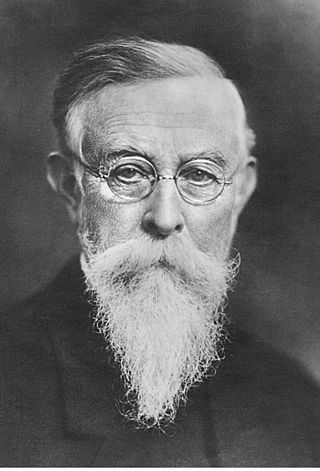Related Research Articles

Peter Joseph William Debye was a Dutch-American physicist and physical chemist, and Nobel laureate in Chemistry.
DPG may refer to

The German Physical Society is the oldest organisation of physicists. As of 2022, the DPG's worldwide membership is cited as 52,220, making it one of the largest national physics societies in the world. The DPG's membership peaked in 2014 when it reached 63,000, but it has been decreasing since then. It holds an annual conference and multiple spring conferences, which are held at various locations and along topical subjects of given sections of the DPG. The DPG serves the fields of pure and applied physics and aims to foster connections among German physicists, as well as the exchange of ideas between its members and foreign colleagues. The bylaws of the DPG commit the organization and its members to maintain scientific integrity and ethics, including freedom, tolerance, truthfulness, and dignity in scientific work, as well as promoting gender equality in the fields of physics and related sciences.
Phytopharmacology is the study and practice of eradicating plant pathology originated from the Verbandes Deutscher Pflanzenärzte (1928–1939),, headed by Otto Appel, known as the Organiser of German Plant Protection, who initially defined the terminology of Phyto-Medicine or Plant Medicine. The Deutsche Phytomedizinische Gesellschaft is the German association of phytomedicine practitioners. Academic programs in phytomedicine, such as at the University of Hohenheim, consider the interrelationships between pathogenic microorganisms and crops, disease control methods, and research programs.
Peter Franz Riederer is a German neuroscientist with several thousands of citations and around 950 scientific writings. He has published more than 620 scientific papers in peer-reviewed scientific journals that are indexed in Medline. He has been author and co-author of more than 20 books relevant to the fields of neuroscience, psychiatry and neurology.

Julius Kühn-Institut – Bundesforschungsinstitut für Kulturpflanzen (JKI) is the German Federal Research Centre for Cultivated Plants. It is a federal research institute and a higher federal authority divided into 15 specialized institutes. Its objectives, mission and research scope were determined by section 11, paragraph 57 of the 1987 Federal Law on the Protection of Cultivated Plants as subsequently amended.

Bärbel Höhn is a German politician for Alliance '90/The Greens. She was elected to the Bundestag in the 2005 national elections, after serving as State Minister of Agriculture of North Rhine-Westphalia from 1995 to 2005.
Ilona Kickbusch is a German political scientist best known for her contribution to health promotion and global health. She is adjunct professor at the Graduate Institute of International and Development Studies, Geneva.
Volker Roemheld was a German agricultural scientist, plant physiologist and soil biologist at Hohenheim University.
Holger Bruno Deising is a German agricultural scientist specialising in Phytomedicine and president of the German Phytomedicine Society.
Falko Feldmann is a German biologist and practitioner of phytomedicine. He is coordinator of matters concerning approval and registration of active substances and agents for plant protection, including international cooperation on questions about European Plant Protection Laws. He also holds the post of director of the Deutschen Phytomedizinischen Gesellschaft e.V. and is involved in a number of organisations and committees relevant to plant protection.
The International Association for the Plant Protection Sciences (IAPPS) has the goal of gathering the results of plant protection research worldwide and making them globally available to science and practice. To this end the organisation periodically publishes the Plant Protection Magazine and every four years organises an international congress. The association has an official scientific journal, Crop Protection, published by Elsevier.

Detlev Ganten is a specialist in pharmacology and molecular medicine and is one of the leading scientists in the field of hypertension. He founded the World Health Summit in 2009. He was Chairman of the Foundation Board of the Charité Foundation (2005–2015), editor of the Journal of Molecular Medicine, Chairman of the Board of Trustees of the Max Planck Institute of Colloids and Interfaces and Max Planck Institute of Molecular Plant Physiology as well as Chairman of the Board of Trustees of the Ethnological Museum Dahlem of the Prussian Cultural Heritage Foundation.

Carl or Karl von Tubeuf FLS HFRSE was a German forestry scientist, mycologist and plant pathologist. He introduced both the term biological control and the use of a biological control to manage a plant disease. He published one of the first books on plant diseases In addition to foundational work in plant pathology, he published broadly on other topics including forest botany, dendrology, mycology, and zoology. He discovered new species of gall mites of conifers.
Johannes Hallmann is a German agricultural scientist of phytomedicine. He is a scientific adviser at the Julius Kühn-Institut, the Federal Research Institute for Cultivated Plants, the Institute for Epidemiology and Pathogen Diagnostics in Münster, the University Professor for Nematology and the President of the German Phytomedicine Society.
Kornelia Smalla is a chemist and biotechnologist at the Julius Kuehn Institute (JKI) in Braunschweig and a university lecturer in microbiology at the Technical University of Braunschweig.
The European Scientific Cooperative on Phytotherapy (ESCOP) was founded in 1989 as an umbrella organisation, representing national European phytotherapy associations. Associations in non-EU states can also be members of ESCOP.

Christian Heinrich Maria Drosten is a German virologist whose research focus is on novel viruses (emergent viruses). During the COVID-19 pandemic, Drosten came to national prominence as an expert on the implications and actions required to combat the illness in Germany.

Bärbel-Maria Kurth is a German statistician and epidemiologist. From 1998 to 2019, she headed the Department of Epidemiology and Health Monitoring at the Robert Koch Institute in Berlin. In 1998, she initiated the first nationwide health survey. Subsequently, she and her department established a continuous health monitoring system for Germany.

Johannes Wagner is a German physician and politician of Alliance 90/The Greens who has been serving as a member of the Bundestag since 2021.